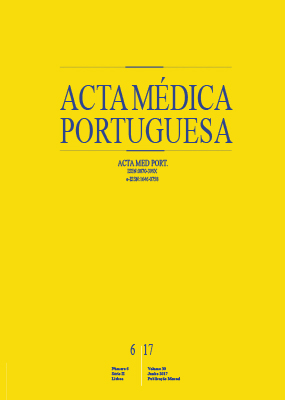Paediatric Invasive Pneumococcal Disease Before Universal Vaccination: 1995 - 2015
DOI:
https://doi.org/10.20344/amp.8493Keywords:
Child, Pneumococcal Infections, Pneumococcal Vaccines, Portugal, Vaccines, ConjugateAbstract
Introduction: Pneumococcal conjugate vaccine was introduced in the private market in Portugal in 2001, reaching over the years a moderately high coverage. In July 2015, it was included in the National Immunisation Program. The aim of this study was to characterize invasive pneumococcal disease in a pediatric hospital before universal use of the vaccine.
Material and Methods: Retrospective analysis of medical records of all children with Streptococcus pneumoniae identified by culture and/or molecular biology (available since 2008), in products obtained from sterile sites, from January 1995 to June 2015. We evaluated demographic, clinical and microbiological data. Serotype results are available since 2004.
Results: Over those 20 years, 112 invasive pneumococcal disease cases were identified, with a median age of 15 months (1 month - 15 years). The median number of cases /year was 4, the highest between 2001 - 2002 (8/year) and 2007 - 2012 (7 - 11/year). The identification occurred mostly in blood culture (72), cerebrospinal fluid (24), pleural fluid (11) an others (5). The most frequent diagnoses were pneumonia (38%), occult bacteraemia (34%) and meningitis (21%). Over the period under review, there was an increase of pneumonia and slight increase of OB, with meningitis cases remaining relatively unchanged.
Discussion: In the last two decades, there was no reduction in the number of cases of invasive pneumococcal disease. There was an increase in isolates from pneumonia and occult bacteraemia that might be due to the introduction of molecular biological methods for Streptococcus pneumoniae detection. Vaccine serotypes were predominant.
Conclusion: This retrospective analysis before universal vaccination will contribute to evaluate the impact of vaccination in the Portuguese pediatric population.
Downloads
Downloads
Published
How to Cite
Issue
Section
License
All the articles published in the AMP are open access and comply with the requirements of funding agencies or academic institutions. The AMP is governed by the terms of the Creative Commons ‘Attribution – Non-Commercial Use - (CC-BY-NC)’ license, regarding the use by third parties.
It is the author’s responsibility to obtain approval for the reproduction of figures, tables, etc. from other publications.
Upon acceptance of an article for publication, the authors will be asked to complete the ICMJE “Copyright Liability and Copyright Sharing Statement “(http://www.actamedicaportuguesa.com/info/AMP-NormasPublicacao.pdf) and the “Declaration of Potential Conflicts of Interest” (http:// www.icmje.org/conflicts-of-interest). An e-mail will be sent to the corresponding author to acknowledge receipt of the manuscript.
After publication, the authors are authorised to make their articles available in repositories of their institutions of origin, as long as they always mention where they were published and according to the Creative Commons license.









